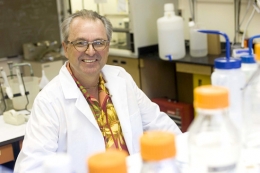Grant Will Continue Support of Research by Renowned Marine Microbial Biologist at the UH School of Ocean and Earth Science and Technology (SOEST)
"Dr. Karl is an outstanding contributor to the field of microbial oceanography. The Gordon and Betty Moore Foundation selected him as a Marine Microbiology Investigator based on his research that spans from cellular to global scales."
Dr. Kelly Kryc, Marine Microbiology Initiative,
Gordon and Betty Moore Foundation
(Honolulu, Hawaiʻi) — University of Hawaiʻi at Mānoa Professor David Karl has been named the recipient of a $3.79 million grant from the Gordon and Betty Moore Foundation to continue and expand research on the microbial inhabitants of the world’s oceans.
Dr. Karl, founder of the Center for Microbial Oceanography: Research and Education (CMORE) at SOEST, has focused his research on the ecological role of microorganisms in the oceans, ranging from the sunlit surface waters to the deep abyss. Dr. Karl has led groundbreaking efforts to promote collaborations among the previously separate disciplines of oceanography, microbiology, ecology and genomics to better understand the sea, including its potential response to environmental variability and climate change.
The grant is in continued support of Dr. Karl to quantify solar energy capture and transduction, and to gain an improved understanding of essential bioelemental cycles and sequestration of atmospheric carbon. Funding will be utilized to develop methods and technology to routinely measure marine microbial community structure and function, to use Seaglider technology — small free-swimming vehicles that gather data from the ocean — to survey habitat variability and to design, construct and field test a mesocosm that can be used to conduct experiments in open ocean habitats.
In 2004, Dr. Karl received a $3.15 million grant from the Gordon and Betty Moore Foundation, as one of seven Marine Microbiology Senior Investigators selected for outstanding contributions to the field of marine microbial ecology. The Senior Investigator Program is part of the Gordon and Betty Moore Foundation’s 10-year, $145 million Marine Microbiology Initiative, which aims to accelerate the creation of new knowledge regarding the composition, function and ecological role of microbial communities in our oceans.
"I am grateful to the Moore Foundation for their continued support of ocean research at UH," said Karl. "I have some new ideas that I would like to pursue and the best support team in the world to make this happen. We are all very excited to be part of this important initiative."
"Dr Karl’s innovative research has lead to a greater understanding of microbial life in the ocean, which modulates the respiration and health of our planet," says Brian Taylor, Dean of SOEST. "A member of the National Academy of Sciences and winner of numerous awards, Dave is one of the nation’s most acclaimed ocean scientists."
Dr. Karl joined the faculty of UH Mānoa in 1978 as an assistant professor of oceanography and was promoted to professor of oceanography in 1987. He has been an adjunct faculty member of the Bermuda Biological Station for Research since 1995 and during the course of his career, he spent three full years at sea, including 23 expeditions to Antarctica. In 1979, he was a member of the Galapagos Rift Biology Expedition and was among the first to observe and sample deep sea hydrothermal vent communities from a submersible vehicle. In 1987, he and his colleagues discovered a new hydrothermal system at the summit of Loʻihi Seamount, the next Hawaiian island. In 1988, Karl and fellow UH researcher Roger Lukas established a long-term study of the impact of climate variability on ecosystem processes.
"Dr. Karl’s work in microbial oceanography is internationally recognized and may answer some of the world’s most pressing environmental and climate related questions," said UH Mānoa Chancellor Virginia Hinshaw. I am truly grateful to the Gordon and Betty Moore Foundation for their most generous investment."
Dr. Karl has received numerous honors and awards including a White House Presidential Young Investigator Award in 1984, the G.E. Hutchinson (1998), A.G. Huntsman (2001) and H.B. Bigelow (2004) medals for his scientific contributions. He has also been awarded the UH Board of Regents Medal of Excellence in Research in 1985 and 1993.

# # #
The Gordon and Betty Moore Foundation, established in 2000, seeks to advance environmental conservation and cutting-edge scientific research around the world and improve the quality of life in the San Francisco Bay Area. For more information, visit www.moore.org.
The School of Ocean and Earth Science and Technology (SOEST) was established by the Board of Regents of the University of Hawaiʻi in 1988. SOEST brings together in a single focused ocean, earth sciences and technology group, some of the nation’s highest quality academic departments, research institutes, federal cooperative programs, and support facilities to meet challenges in the ocean and earth sciences. Scientists at SOEST are supported by both state and federal funds as they endeavor to understand the subtle and complex interrelations of the seas, the atmosphere, and the earth. For more information, visit www.soest.hawaii.edu.
The University of Hawaiʻi Foundation, a nonprofit organization, raises private funds to support the University of Hawaiʻi System. The mission of the University of Hawaiʻi Foundation is to unite donors' passions with the University of Hawaiʻi’s aspirations by raising philanthropic support and managing private investments to benefit UH, the people of Hawaiʻi and our future generations www.uhfoundation.org.